- Home
- John Kendrick Bangs
Budd Boyd's Triumph; or, The Boy-Firm of Fox Island
Budd Boyd's Triumph; or, The Boy-Firm of Fox Island Read online
Produced by Al Haines.
Cover art]
BUDD BOYD'S TRIUMPH;
OR,
THE BOY-FIRM OF FOX ISLAND.
By WILLIAM PENDLETON CHIPMAN,
_Author of_
"Roy Gilbert's Search," "The Mill-Boy of the Genesee," "The Black Forge Mills," etc., etc.
ILLUSTRATED.
NEW YORK:
A. L. BURT, PUBLISHER.
COPYRIGHT 1890, BY A. L. BURT.
----
CONTENTS
CHAPTER I.--BUDD SEEKS EMPLOYMENT. CHAPTER II.--A SLIGHT MISUNDERSTANDING. CHAPTER III.--AGAINST WIND AND TIDE. CHAPTER IV.--A NEW FRIEND. CHAPTER V.--MR. BENTON'S WRATH. CHAPTER VI.--THE NEW FIRM. CHAPTER VII.--BUSINESS BOOMS. CHAPTER VIII.--THE LOST OX-CART. CHAPTER IX.--THE THREE INTRUDERS. CHAPTER X.--BUDD'S STORY. CHAPTER XI.--AN UNFORTUNATE PREDICAMENT. CHAPTER XII.--BUDD'S TRIAL. CHAPTER XIII.--MR. BENTON'S LITTLE GAME. CHAPTER XIV.--TWO OPPORTUNITIES. CHAPTER XV.--BUDD ENTRAPPED. CHAPTER XVI.--JUDD MAKES AN IMPORTANT DISCOVERY. CHAPTER XVII.--BUDD'S ESCAPE. CHAPTER XVIII.--CAUGHT. CHAPTER XIX.--MR. JOHNSON IS ASTONISHED. CHAPTER XX.--THE CONFESSION. CHAPTER XXI.--FATHER AND SON. CHAPTER XXII.--AN EXCITING ADVENTURE. CHAPTER XXIII.--A MANLY RESCUE. CHAPTER XXIV.--THE FIRM'S PROFITS. CHAPTER XXV.--MR. JOHNSON'S MUNIFICENCE. THE BEAR AND THE BOMB SHELL. AN AFTERNOON AT SAGAMORE POND. HOW JACK WENT TIGER-HUNTING.
----
BUDD BOYD'S TRIUMPH.
CHAPTER I.--BUDD SEEKS EMPLOYMENT.
It was a raw, cold, day in the month of March. Since early morning theclouds had been gathering, and they now hung dark and heavy over bothland and sea. The wind, too, which had for hours been steadilyincreasing in violence, now blew little short of a gale. It evidentlywas going to be a terrible night, and that night was near at hand.
No one realized this more than the young lad, who, with a small bundlein one hand and a stout staff in the other, was walking rapidly alongthe highway that runs near the west shore of Narragansett Bay. He was alad that would have attracted attention anywhere. Tall for his age,which could not have been far from sixteen years, he was also of goodproportions, and walked with an ease and stride which suggested reservedstrength and muscular development.
But it was the lad's face that was the most noticeable. Frank, open, ofsingular beauty in feature and outline, there were also upon itunmistakable evidences of intelligence, resoluteness, and honesty ofpurpose. A close observer might also have detected traces of sufferingor of sorrow on it--possibly of some great burden hard to bear.
The lad was none too warmly clad for the chilly air and piercing wind,and now and then drew his light overcoat about him as though even hisrapid walking did not make him entirely comfortable. He also lookedeagerly ahead, like one who was watching for some signs of hisdestination. He drew a sigh of relief as he reached the foot of a steephill, and said aloud:
"I must be near the place, now. They said it was at the top of thefirst long hill I came to, and this must be the hill."
As he spoke he quickened his pace to a run, and soon reached the summit,quite out of breath, but with a genial warmth in his body that he hadnot experienced for some hours.
Pausing now a moment to catch his breath, he looked about him. Dim aswas the light of the fast-falling evening, he could not help giving anexclamation of delight at the vision he beheld. To the north and westof him he saw the twinkling lights of several villages through which hehad already passed. To the east of him was the bay, its tossing wavescapped with white, its islands like so many dark gems on the bosom ofthe angry waters. To the south there was first a stretch of land, andthen the broad expanse of the well-nigh boundless ocean.
"It must be a beautiful place to live, and I hope to find a home here,"he remarked, as he resumed his journey.
A few rods farther on he came to a farm-house, and turned up to itsnearest door. As he was about to knock, a man came from the barn-yard,a little distance away, and accosted him:
"Good-evening!"
"Good-evening!" responded the lad.
Then he asked:
"Is this Mr. Benton?"
"No; I'm Mr. Wright," answered the man, pleasantly. "Benton lives onthe next farm. You will have to turn into the next gateway and go downthe lane, as his house stands some distance from the road."
"I was told," explained the lad, "that he wished to hire help, and Ihoped to get work there. Could you tell me what the prospect is?"
The man had now reached the boy's side, and was looking him over withevident curiosity.
"Well," he replied, slowly, "I think he wants to get a young fellow forthe coming season, and hadn't hired anyone the last I knew. But I guessyou must be a stranger in these parts."
"Yes," the lad answered, briefly; and then thanking the man for hisinformation he turned away.
"I thought so," the man called after him, "else you wouldn't want to gothere to work."
The boy scarcely gave heed to the remark then; but it was not longbefore he knew by hard experience the meaning of it.
A quarter of a mile farther on he reached a gate, and passing throughit, he hastened down the narrow lane till he came to a long, low,dilapidated house; but in the darkness, which had by this time fallen,he was not able to form any definite idea of his surroundings.
A feeble light came forth from a back window, and guided by this, hefound the rear door of the building. To his knock there was a chorus ofresponses. Dogs barked, children screamed, and above the din a gruffvoice shouted:
"Come in!"
A little disconcerted by the unusual sounds, the lad, instead of obeyingthe invitation, knocked again. Then there was a heavy step across thefloor, the door swung open with a jerk, and a tall, raw-boned man,shaggy-bearded and shock-haired, stood on the threshold.
Eying the lad for a moment in surprise, he asked, somewhat surlily:
"What do you want, youngster?"
"Are you Mr. Benton?" the lad asked.
"Yes; what of it?" the man answered, sharply.
"I was told you wanted help, and I have called to see about it,"explained the boy.
"Come in, then," said the man, and his tones were wonderfully modified.
The lad now obeyed, and found himself in a large room, evidently thekitchen and living-room all in one. There was no carpet on the floor,and a stove, a table and a half-dozen chairs constituted its furniture.
Two large dogs lay before the fire, growling sullenly. A woman and foursmall children were seated at the table. An empty chair and anunemptied plate showed that Mr. Benton had been eating when he wascalled to the door.
There was food enough upon the table, but its disorderly arrangement,and the hap-hazard way in which each child was helping itself, causedthe lad to give an involuntary shudder as his host invited him to sitdown "an' take a bite while they talked over business together."
Mr. Benton evidently meant to give his caller a most flatteringimpression of his hospitality, for he heaped the lad's plate with coldpork, brown bread, and vegetables, and even called on his wife to getsome of that "apple sass" for the young stranger.
The boy was hungry, and the food was, after all, wholesome, and hestowed away a quantity that surprised himself, if not his host. Whensupper was eaten, Mr. Benton
pushed back his chair and abruptly askedhis guest:
"Who are ye?"
"Budd Boyd," promptly answered the lad.
"That's a kinder cur'us name, now ain't it?" questioned Mr. Benton. "Idunno any Boyds round here. Where be ye from?"
"I came from Massachusetts," replied Budd, with the air of one who hadstudied his answer; but it seemed for some reason to be verysatisfactory to his questioner.
"Any parents?" next inquired Mr. Benton.
"My mother is dead, and my father is not keeping house now. I'm to lookout for myself," said the lad, somewhat hesitatingly.
"I guess ye ain't used to farm work, be ye?" now inquired Mr. Benton,doubtingly, and looking at Budd's hands, which were as white and soft asa lady's.
"No, sir; but I'm willing to learn," said the lad.
"Of course ye can't expect much in the way of wages," remarked Mr.Benton, cautiously.
"No, not until I can do my full share of work," said Budd,indifferently.
A light gleamed for a moment in Mr. Benton's eyes.
"I might give ye ten dollars a month an' board, beginnin' the fust ofthe month, ye to work round for yer board till then," he ventured.
"Very well," responded the lad; and immediately after he added:
"I've walked a good ways to-day, and if you don't mind, I'll go to myroom."
"Purhaps we'd better draw up a paper of agreement, an' both of us signit," suggested Mr. Benton, rubbing his hands vigorously together, asthough well pleased with himself and everybody else.
"All right, if that is your custom," said Budd. "Draw up the paper, andI'll sign it."
After considerable effort, Mr. Benton produced the following document:
On this 20 day of March Budd Boyd, a miner of Mass., agres to work forme, John Benton. He's to begin work April fust, an' work 6 munths, at10 dollers an' bord. He's to work til the fust for his bord. If hequits work before his time is up he's to have no pay. To this I agree.
JOHN BENTON, on his part.
Budd read the paper, and could scarcely suppress a smile as he signedhis name under Mr. Benton's, and in imitation of him, added the words"on his part" after the signature. He knew, however much importance Mr.Benton might attach to it, that as a legal document it had no specialforce. He simply set the whole act down as one of the whims of hisemployer, and gave no more thought to the matter. But it was destinedto serve that gentleman's purpose, nevertheless, until taken forciblyfrom him.
Mr. Benton now showed Budd up to a back room on the second floor, andtelling him that he would call him early in the morning, bade himgood-night.
The room the lad had entered was bare and cold. A single chair, a narrowbedstead, a rude rack on the wall to hang his garments upon, were all itcontained. Yet it was evidently with some satisfaction that the ladopened his bundle, hung up the few clothes it held, and prepared forbed. As he drew the quilts over himself he murmured:
"I don't think I ever had more uncomfortable quarters in my life, andthe outlook for the next six months, at least, is far from encouraging.Still, I would not go back to what I have left behind for anything."
He was tired. The rain that was now falling heavily upon the roof justover his head acted as a sedative and lulled him to sleep. But his wasnot an unbroken rest, for at times he tossed to and fro, and mutteredstrange sentences. One was, "Father never did it; how could they treathim so?" Another, "I can never face them again; no, never!" Stillanother, "Thank Heaven, mother never lived to know the worst!" Afterthat the troubled sleeper must have had pleasanter dreams, for hemurmured the words, "Mother; father; a home at last!" From these,however, he was rudely awakened by a gruff call:
"Budd! Budd! get up and come out to the barn."
Dazed, bewildered, he arose, and groped about in the darkness for hisclothing. By the time he was dressed a full consciousness of hissituation had come back to him, and with a stout heart he went out, tobegin what was to him equally new duties and a new life.

 The Genial Idiot: His Views and Reviews
The Genial Idiot: His Views and Reviews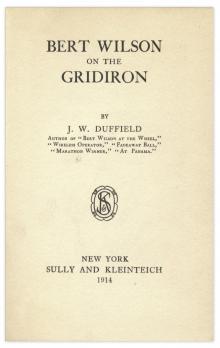 Bert Wilson, Marathon Winner
Bert Wilson, Marathon Winner The Enchanted Typewriter
The Enchanted Typewriter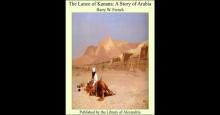 The Lance of Kanana: A Story of Arabia
The Lance of Kanana: A Story of Arabia Coffee and Repartee
Coffee and Repartee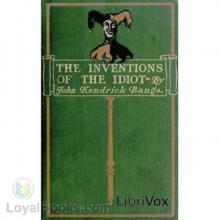 The Idiot at Home
The Idiot at Home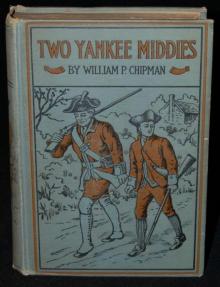 Budd Boyd's Triumph; or, The Boy-Firm of Fox Island
Budd Boyd's Triumph; or, The Boy-Firm of Fox Island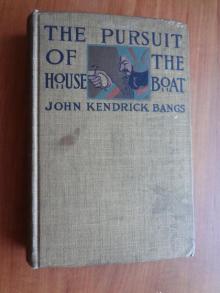 The Pursuit of the House-Boat
The Pursuit of the House-Boat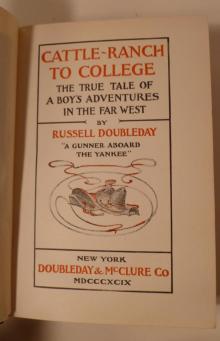 Cattle-Ranch to College
Cattle-Ranch to College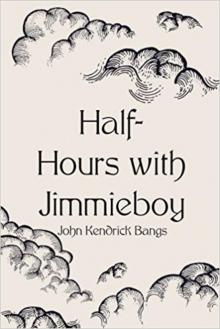 Half-Hours with Jimmieboy
Half-Hours with Jimmieboy Bikey the Skicycle and Other Tales of Jimmieboy
Bikey the Skicycle and Other Tales of Jimmieboy Toppleton's Client; Or, A Spirit in Exile
Toppleton's Client; Or, A Spirit in Exile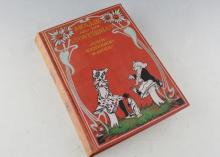 Mollie and the Unwiseman
Mollie and the Unwiseman The Inventions of the Idiot
The Inventions of the Idiot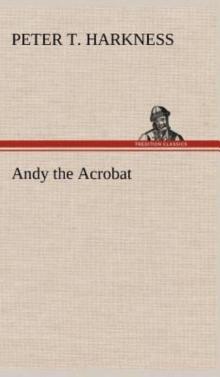 Andy the Acrobat
Andy the Acrobat In Camp With A Tin Soldier
In Camp With A Tin Soldier Angel over the Right Shoulder
Angel over the Right Shoulder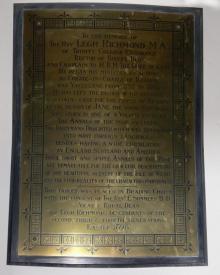 Annals of the Poor
Annals of the Poor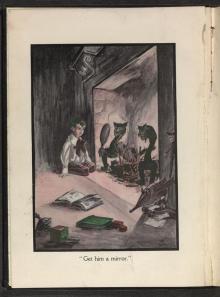 Andiron Tales
Andiron Tales Andy at Yale
Andy at Yale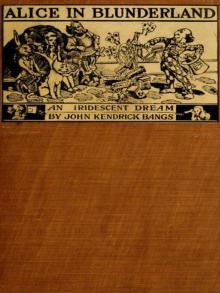 Alice In Blunderland
Alice In Blunderland